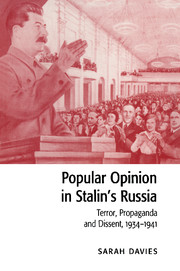Book contents
- Frontmatter
- Contents
- List of tables
- Acknowledgements
- Chronology
- List of abbreviations and archive references
- Glossary and notes on the text
- Introduction
- PART I ECONOMY AND SOCIETY
- 1 Workers, the economy, and labour policy
- 2 Peasants and the kolkhoz
- 3 Women, family policy, education
- 4 Religion and the nationalities question
- PART II POLITICS AND TERROR
- PART III THE LEADER CULT
- Conclusion
- Notes
- Bibliography
- Index
1 - Workers, the economy, and labour policy
Published online by Cambridge University Press: 25 March 2010
- Frontmatter
- Contents
- List of tables
- Acknowledgements
- Chronology
- List of abbreviations and archive references
- Glossary and notes on the text
- Introduction
- PART I ECONOMY AND SOCIETY
- 1 Workers, the economy, and labour policy
- 2 Peasants and the kolkhoz
- 3 Women, family policy, education
- 4 Religion and the nationalities question
- PART II POLITICS AND TERROR
- PART III THE LEADER CULT
- Conclusion
- Notes
- Bibliography
- Index
Summary
At the end of the 1920s, Stalin launched the Great Leap Forward, an economic revolution of unprecedented speed and magnitude. Although crash industrialisation brought workers certain benefits, such as virtually full employment, it also created enormous hardship. Despite a modest improvement in their living standards during the second five-year plan, the immediate priority for most workers in the 1930s was sheer survival. Unsurprisingly, economic questions featured more prominently than any other issue in popular opinion. This chapter will examine workers' views on subjects such as the end of rationing, state loans, price rises, and shortages. It will also consider their reactions to the main innovations in labour policy: Stakhanovism and the labour decrees of 1938–40.
Workers were acutely aware of fluctuations in their standard of living, frequently comparing prices with wages. It was patently obvious to them whether their own economic situation was improving or deteriorating, and they were not deceived by official rhetoric about rising standards. The rhetoric simply highlighted the disparity between the fictitious ‘good life’ and their actual situation. Their personal experience of the Soviet economy, with its queues and deficits, led to criticism of the regime's refusal to address such issues publicly. Many of their comments reveal a belief that the state ought to be providing for workers as it claimed it was doing. Workers showed no hesitation in invoking the regime's own ideological claims: for example, they readily deployed the party's own rhetoric on workers' emancipation.
- Type
- Chapter
- Information
- Popular Opinion in Stalin's RussiaTerror, Propaganda and Dissent, 1934–1941, pp. 23 - 48Publisher: Cambridge University PressPrint publication year: 1997



